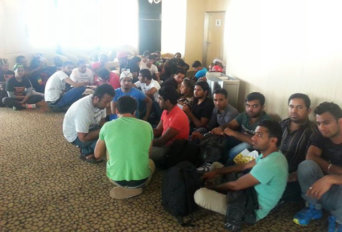- About
- Topics
- Picks
- Audio
- Story
- In-Depth
- Opinion
- News
- Donate
- Signup for our newsletterOur Editors' Best Picks.Send
Read, Debate: Engage.
"Please translate for us," a refugee calls out to police as a group of protesters are split up, "since we are not allowed to learn German."
It's the perfect moment of irony in what has been more than a year of protests against the harsh conditions dictating the lives of Germany's refugees who wait in limbo, often for years, to hear whether they will be allowed to stay or sent back home.
This Wednesday 37 refugees occupied the viewing deck of Berlin's iconic TV Tower in an attempt to make themselves more visible to the public.
In a joint statement they explained: "Everywhere we are turned away. Everyone has the same answer for us. Everyone refers us to the next person. No one listens to us. No one wants to be responsible for us refugees and the inhumane laws under which we live."
This protest is only the most recent of many around the country and particularly in Berlin, where until April a group of refugees lived in a public park in Kreuzberg for more than a year.
In recent weeks attempts to evict refugees from an empty school in the same neighbourhood were met with some members of the group threatening to jump from the rooftop.
The police responded with a 900-strong force, blocking off the street for more than a week while they tried to persuade the 30-40 refugees to move voluntarily, as they did not have the power to use force. Social media was full of reports of police brutality, including claims that some refugees had bananas thrown at them by police - a particularly malicious act at the beginning of Ramadan for which many of the group were fasting.
Many of the refugees up the TV tower, as well as those who lived on Oranienplatz in Kreuzberg and those who are still occupying the Gerhart Hauptmann Schule, have been waiting to hear the result of their asylum applications for three, four or even five years.
As if the incredibly long waiting time for processing applications is not enough, refugees are not allowed to work for the first nine months after they arrive, cannot attend school to prepare themselves for a new life or leave the area to which their application has been assigned, and it is the lack of these rights which have brought them out in protest. Many of the refugees who lived at Oranienplatz had marched out of their designated areas in Bavaria, hundreds of kilometres away, protesting their inability to travel.
The issue is symptomatic of a failed EU migration system which was a key issue of the EU elections in May and continues to remain unsolved.
The refugees in Berlin have been heartily supported by a community of locals who regularly gather in support of better rights for refugees waiting to hear their fate.
Their catch cry: "You can't evict a movement."
